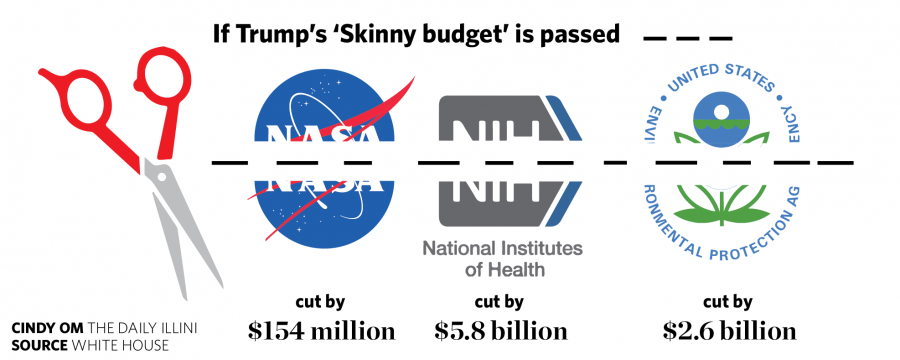Champaign to host own March for Science
April 20, 2017
The worldwide March for Science will take place on Saturday, April 22, and the Champaign-Urbana community is joining in by hosting their own march at the Orpheum Children’s Science Museum.
According to the March for Science’s press webpage, there will be around 400 marches and rallies taking place in 37 different countries around the world on Saturday.
Elizabeth Sotiropoulos, co-owner of Illini Tutoring, is one of 12 organizers for the march in Champaign. According to the Facebook event, over 450 people have marked they will attend and over 1,000 are interested.
“The march is a protest of what Trump has said against science,” Sotiropoulos said. “It is also a way for people to come together and stand in solidarity against those unfair cuts President Trump has taken.”
President Donald Trump’s proposed budget would cut funding for a wide array of health and science agencies and organizations.
Get The Daily Illini in your inbox!
The National Institute of Health is facing budget cuts of 18 percent, totaling near $5.9 billion. The Environmental Protection Agency’s budget will lose around $2.52 billion in funding, a 31 percent cut. The National Aeronautics and Space Administration would lose approximately $102 million from their annual budget.
Some organizations, like the Advanced Research Projects Agency-Energy would be cut in their entirety. The ARPA-E had annual funding of $1.5 billion for 580 different projects researching renewable energy and efficiency.
Sotiropoulos said that the March for Science in Champaign is a youth march that would focus on getting the younger generations involved.
“We want science to be more diverse. We want to see better representation of all people in science, and we think it starts at (a) younger level,” she said. “We also want the children to know that they have a voice, and they can stand up for themselves.”
Sotiropoulos said that despite the march focusing on the youth, everyone is welcomed.
“The idea is that we want to educate people about why science is important,” she said, “and why the policies regarding science, especially at the national level, are important.”
The march will start at the Orpheum Children’s Science Museum at 5 p.m., led by children from kindergarten to 12th grade, and end back at the museum after going through downtown Champaign.
After the march, seven speakers from varying fields will present speeches with the importance of science as the common theme. The speakers are: May Berenbaum, an entomologist; Amy Betzelberger, a plant biologist; Shane Campbell-Staton, an evolutionary biologist; Rochelle Gutierrez, a mathematics education scientist; Saba Manetti-Tesfaye, a high school student; Erfan Mohammadi, a chemical engineering graduate student; and Julie Pryde, a public health administrator.
The march is not being hosted by a singular organization. Both the planning and execution of the march are volunteer-based.
“A lot of the organizers are UI grad students,” Sotiropoulos said. “They are working really hard (to) bring in different groups from UI to the march.”
However, not everyone is enthusiastic about the idea of protesting.
“Some (University) researchers would not get involved, because they are afraid what would happen after they speak up,” Sotiropoulos said.
According to the national March for Science’s mission web page, it lists that the march has generated conversations about whether scientists should be involved in politics.
“I don’t think scientists should be too ready to be political,” said Henry McDonald, sophomore in Engineering. “Debates over science issues haven’t been over yet.”
Angie Isaacs, social media manager of the march, said in an email that the Champaign-Urbana March for Science is aiming to take a politically neutral stance.
“If anything, we are fighting for our right to be neutral and conduct research without regard for politics,” Isaacs said.
The aim of the March for Science is to show their disapproval of the proposed budget.
“It is a testament shown in the Women’s March,” Sotiropoulos said. “It means people are not satisfied with how things are going right now.”







